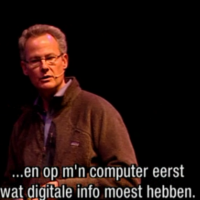For a long time, ICT seemed to be the solution to the increasing complexity of the world, to the increasing complexity of the questions and that of the answers, the yearly increase by 100% of information on the internet, the total information overload; ring binders and address books were replaced by digital systems, and without any definite expectations, we were surprised every time by the results of our innovations.
That’s the story of how ICT became a magic wand, from a magical fairy tale world where more could be done in less time, with less money, by less people, and regardless of time or location. Always on, always connected, always in motion. ICT was an end in itself, rather than a means. But where ICT appears to have made the world smaller and simpler, it’s becoming more common for systems to develop a life of their own. And for the systems to know more about us than we know about the systems. People are less in charge of their own lives, and more a slave to the constant flow of information and knowledge, and we do what we are told is best for us. Told by computers.
That’s the way ICT is used more and more often these days. Not as a tool. Not for support. But to replace people, check on people and manage people. And eventually, to replace our thoughts.
IBM developed a supercomputer named Watson. This computer makes it possible to diagnose you automatically, based on your digital patient records, and if need be, with additional examination prescribed by the computer. After that, the Clinical Decision Support System (CDSS) determines your treatment and medication. A different area where human thought could become obsolete by as early as 2025 is the judicial system; for starters, think of the handling of objections to traffic tickets. And suppose that Facebook would put its 1 billion user database to use and apply the latest scientific findings on attraction and on what types of relationships do and do not work out, to offer you three suggestions for ‘ideal’ lovers. Wouldn’t we be too curious not to have a look, and thus create a self fulfilling prophecy?
Essentially, the roles have been reversed: systems used to do what we wanted them to do, but now they’re telling us how to live our lives. It’s just like the economy. That’ll be the year 2025.

Leave a Reply